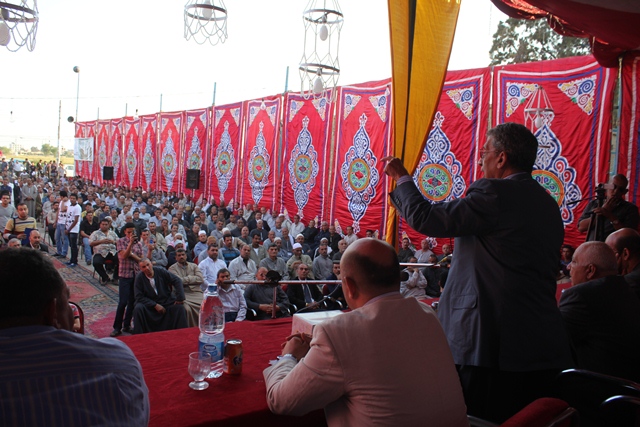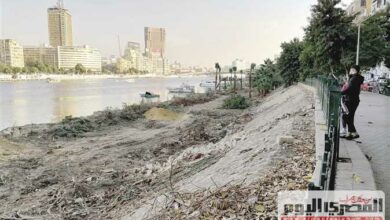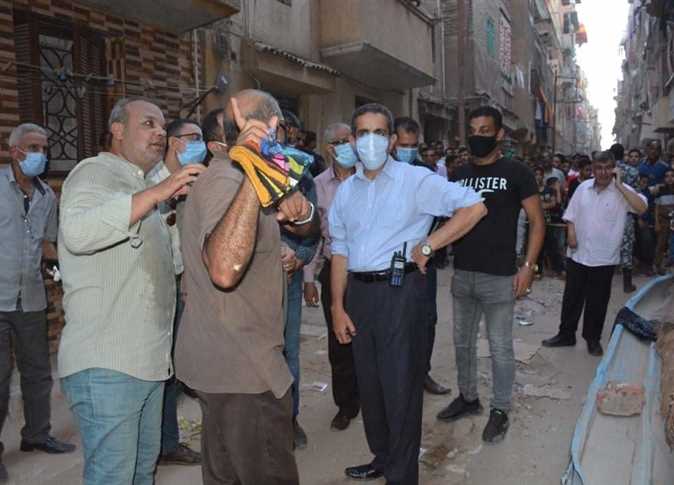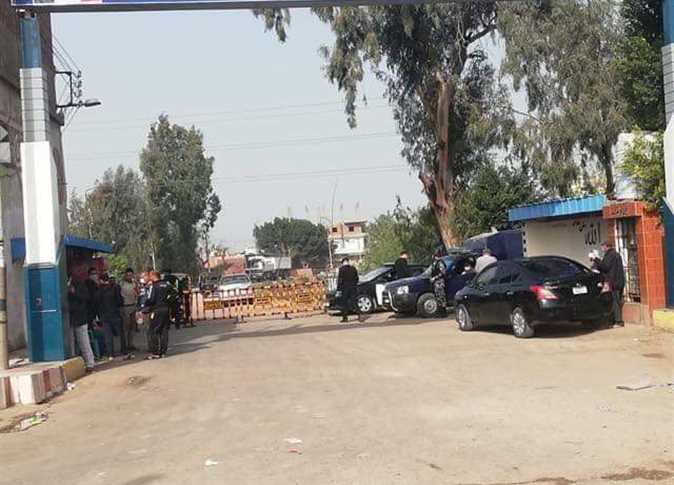
In Gabereya, a small town in the heart of Gharbiya Governorate, two dozen men in their 20s who came from the neighboring town of Kafr Hegazy waited in an empty tent set up in preparation for the visit of presidential candidate Amr Moussa, expected to arrive within the hour.
Speaking to Egypt Independent, the young men expressed their frustration about not seeing any improvement in their lives since the revolution began. After voting for the Muslim Brotherhood in parliamentary elections last year, they have been disappointed by the results. Moussa, they hope, would be the one to respond to their demands.
Half an hour later, Moussa arrived.
The crowd greeted the 76-year-old former diplomat with chants and a band. Throughout the hour-long rally, and in two rallies later in the day in the same area, some supporters were already referring to Moussa as Mr. President.
Amr Moussa, it seems, has figured out how to speak the words that many Mahalla residents want to hear.
With “Poverty is our number one enemy” as his campaign slogan, Moussa largely skips emotional rhetoric and instead focuses on proposing practical solutions to people’s most pressing problems.
He presents himself as the candidate with the political experience to pull Egypt out of what he describes as a crisis worse than any it has faced in the last two centuries, into the prosperity that many hope the revolution will bring.
Moussa tells his audience that Egypt’s “second republic,” his name for the first post-Mubarak government, will start the day after the presidential election. He stresses that the four years, the only term he says he will serve, will be full of challenges and opportunities that require a strong statesman.
“This is a time in which we need to elect officials who understand the problems and know their solutions,” he says.
Moussa paints a picture of a scary present with an economy going downhill, but he assures his audience that the cause of the problems is not the lack of resources, but mismanagement. To demonstrate the ease with which he would be able to solve problems that Egyptians have been struggling with for decades, he gives practical examples.
Addressing the number one concern of his audience, Moussa suggests an unemployment allowance and alterations to the educational system to produce more desirable employees.
Being in an area that is primarily dependent on agriculture, Moussa also discusses the problems of farmers. He assures them that agriculture is at the top of his agenda.
“I care a lot about the problems of the farmers and the village because this is where I came from. I was raised in its fields, I smell its scent and I know its importance in building the country,” Moussa, a Gharbiya Governorate native, told the elated crowd.
Outside of the tent, a few people parked their tuk tuks, the small three-wheeled vehicles used to navigate narrow roads in rural villages and informal neighborhoods. Many of the village’s residents drive tuk tuks for a living. Before the event began, some tuk tuk drivers complained about licensing problems that cause their tuk tuks to be confiscated for months at a time.
Seemingly reading their minds, Moussa addressed the tuk tuk issue — not usually the province of presidential candidates — head on, suggesting official licensing and the creation of a syndicate for tuk tuk drivers.
Moussa’s practical speeches appealed to the audience who came to the rallies hoping to hear exactly that. As supportive as they say they are of the revolution, they seemed hungry for stability.
“We want the old regime but without the corruption, with a fresh outlook,” said Abel Alim Bedeir, a veterinarian from Gabereya. “We don’t want someone new who would shake the whole being of the state and start from scratch.”
Having served under Mubarak for 10 years as foreign minister, but one who has distanced himself from the taint of corruption, Moussa is a perfect choice for Bedeir and many others who want change — but not too much.
Realizing that the people are out of patience after over a year of economic hardship and disappointment, Moussa offers a plan promising immediate results in addition to long-term goals.
Moussa says that during the first 100 days of his term, he will take action regarding corruption, unemployment and the economy that will result in significant improvement of Egyptians’ situation. Moussa says that by the end of his four-year term, the national income will be doubled and Egypt will achieve a 100 percent literacy rate, up from the current level, which is around 60 percent.
Moussa unveiled his campaign platform on Tuesday in Ezbet al-Hagana, one of Cairo’s poor, informal neighborhoods. Playing on the same themes he employed at his rural rallies, Moussa addressed the small crowd of residents, reiterating his promises that they will no longer be marginalized and that his first priority will be the issues that matter most to them: poverty, illiteracy and unemployment.
“The ordinary citizen is our goal, because he's the one who has been marginalized, and the first government in the second republic has an obligation towards this citizen,” he said, as the crowd chanted, “We love you, Moussa.”
“If elected president, this is not what I promise to do, it’s what I vow to do,” he declared.
Moussa seldom mentions the revolution in his rallies, except as the event that laid the ground for the development that he promises.
“We work in the framework of the revolution, a revolution that is ongoing and successful, and one that we have to protect,” he says.
But Moussa’s idea of a continuing revolution is reform. The next phase will finally start to bear fruit for the ordinary citizen, he claims.
“So that the revolution continues in a way that benefits the people, we will fix all our issues with a revolutionary spirit and action,” he says.
In response to an audience member accusing him of being against the revolution that he says he will continue, Moussa answered: “The revolution belongs to all of us; it’s not monopolized by one group. We are all with the revolution and it will continue with us and for us.”




